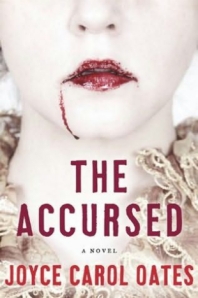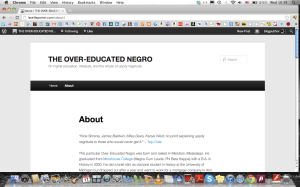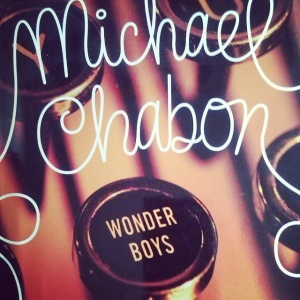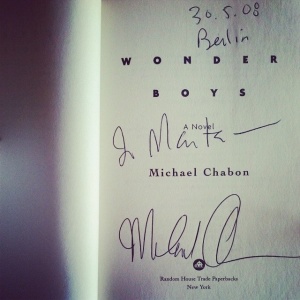-
Recent Posts
- The American Book Review: The New Campus Novel Issue
- The New Millennial Academic Novels – Jeffrey J. Williams’ New Essay
- An Obscure Academic Novel Well Worth Reading by Professor Merritt Moseley
- CfP: MLA Session “Where are the Wonder Girls? Heroines and Persistence in Campus Novels”, Jan 7-10,2020. Deadline for abstracts: March 15, 2020.
- Real Life by Brandon Taylor
Recent Comments
kuhblasen on Why you should be reading Cow… merrittmoseley on An Obscure Academic Novel Well… Michael Wilding on An Obscure Academic Novel Well… merrittmoseley on Ms. Mentor’s Summer Read… Lavelle on Black Academic Fiction Archives
Meta
Categories
- "Schoolsville"
- academic novel
- Bez kategorii
- Bibliography
- blogs
- campus novel
- CfP
- Chicago Tribune
- college novel
- Conferences
- films
- Financial TImes
- graduate students
- Guardian
- Huffington Post
- Independent
- Inside Higher Ed
- L.A. Times
- LA Times
- Lists
- Ms. Mentor
- NY Times
- Rankings
- Slate
- The Canberra Times
- The Chronicle of Higher Education
- The Guardian
- The New Republic
- The Wall Street Journal
- The Washington Post
- Themes
- USA Today
Tagi
A New Life Bernard Malamud Blue Angel Bret Easton Ellis Brideshead Revisited campus novel Chad Harbach Changing Places David Lodge Dead Poets Society Dear Committee Members Disgrace Don DeLillo Donna Tartt Elaine Showalter Evelyn Waugh F.Scott Fitzgerald Fanshawe Francine Prose I am Charlotte Simmons J.M. Coetzee James Hynes Jane Smiley Jeffrey Eugenides Jeffrey J. Williams John Williams Jonathan Franzen Jonathan Lethem Julie Schumacher Kingsley Amis Lorrie Moore Lucky Jim Malcolm Bradbury Mary McCarthy Max Beerbohm Michael Chabon Moo Nathaniel Hawthorne Neal Stephenson Nice Work Oleanna On Beauty Pale Fire Paul Auster Philip Roth Pictures from an Institution Pnin Porterhouse Blue Randall Jarrell Richard Russo Saul Bellow Small World Stoner Straight Man Surviving Desire The Art of Fielding The Corrections The Groves of Academe The History Man The Human Stain The Marriage Plot The Professor's House The Rules of Attraction The Secret History The Squid and the Whale This Side of Paradise Tom Sharpe Tom Wolfe Vladimir Nabokov White Noise Who’s Afraid of Virginia Woolf? Willa Cather Wonder Boys Zadie Smith Zuleika Dobson-
Join 19 other subscribers
- Follow "Schoolsville:" Academic/Campus/College/University Fiction on WordPress.com
Stats
- 11,649 hits
Tag Archives: Wonder Boys
The New Millennial Academic Novels – Jeffrey J. Williams’ New Essay
Posted in "Schoolsville", academic novel, blogs, campus novel, college novel, graduate students, Inside Higher Ed
Tagged Chemistry, Conversations With Friends, Lucky Jim, Normal People, Publish and Perish, Straight Man, The Life of the Mind, The Mirror Has Two Faces, The Paper Chase, The Shakespeare Requirement, Wonder Boys
Ms. Mentor Recommends: How to Write a Successful Academic Novel & A Summer Reading List
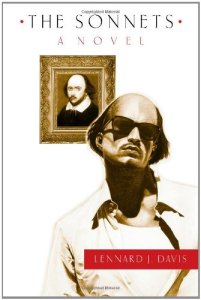 “You’ll start, naturally, with the terror of the blank screen. Never tell yourself, ‘I am going to commit an act of literature.’ That can paralyze you. Instead, try: ‘I am going to write a horrendously awful first draft.’ That’ll get you started. Setting yourself a daily writing quota is helpful. It can be time (an hour a day) or words (500 words a day). Ms. Mentor presumes you have something in mind for your academic novel. Perhaps there’s a character you want to create—a struggling adjunct, an aggrieved graduate student, a free spirit who says the-hell-with-it-all. Probably you want some kind of revenge. First let Ms. Mentor tell you what not to do in writing your masterpiece—at least if you want her to approve of your final product.”
“You’ll start, naturally, with the terror of the blank screen. Never tell yourself, ‘I am going to commit an act of literature.’ That can paralyze you. Instead, try: ‘I am going to write a horrendously awful first draft.’ That’ll get you started. Setting yourself a daily writing quota is helpful. It can be time (an hour a day) or words (500 words a day). Ms. Mentor presumes you have something in mind for your academic novel. Perhaps there’s a character you want to create—a struggling adjunct, an aggrieved graduate student, a free spirit who says the-hell-with-it-all. Probably you want some kind of revenge. First let Ms. Mentor tell you what not to do in writing your masterpiece—at least if you want her to approve of your final product.”
June 2, 2014 – The Chronicle of Higher Education
Writing Academic Novels for Fun and (Little) Profit by Ms. Mentor
Posted in Bibliography, campus novel, college novel, Ms. Mentor, The Chronicle of Higher Education
Tagged A Question of Attraction, A.C. Roberts, Academic Affairs, Admission, Advice from Pigeons, Alicia Stone, Betty Younis, Blue Angel, Carnal Academy, Co-Ed Naked Philosophy, David Lodge, David Nicholls, Elaine Showalter, Faculty Towers, Francine Prose, Graeme Simsion, Jean Hanff Korelitz, Jeffrey J. Williams, Joel Shatzky, Jon Michael Miller, Lawrence S. Wittner, Lennard Davis, Lesley Wheeler, Mary McCarthy, Michael Chabon, Murder Most Academic, Nancy Mary, On Beauty, Option Three, Patricia S. Bowne, Photo Sessions, Poison and Papyrus, Richard Russo, Small World, Straight Man, Tenure Track, The Groves of Academe, The Receptionist and Other Tales, The Rise of the Academic Novel, The Rosie Project, The Sonnets, Victoria Bradley, What's Going On, While Herding Cats, Will Forest, William G. Tierney, Wonder Boys, Zadie Smith
John Williams’ 1965 Stoner: An Afterlife
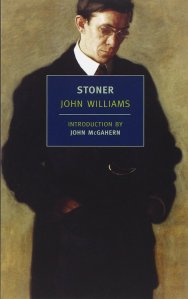 “Whatever the reasons for its cooler reception in the US, I don’t agree that the novel is ‘minor’; nor do I think it is ‘great’ in the way that, say, Gatsby or Updike’s Rabbit quartet are great. I think Williams himself got it right: it is ‘substantially good.’ It is good, and it has considerable substance, and gravity, and continuation in the mind afterwards. And it is a true ‘reader’s novel,’ in the sense that its narrative reinforces the very value of reading and study. Many will be reminded of their own lectoral epiphanies, of those moments when the magic of literature first made some kind of distant sense, first suggested that this might be the best way of understanding life. And readers are also aware that this sacred inner space, in which reading and ruminating and being oneself happen, is increasingly threatened by what Stoner refers to as ‘the world’ – which is nowadays full of hectic interference with, and constant surveillance of, the individual. Perhaps something of this anxiety lies behind the renaissance of the novel. But you should – indeed must – find out for yourself.”
“Whatever the reasons for its cooler reception in the US, I don’t agree that the novel is ‘minor’; nor do I think it is ‘great’ in the way that, say, Gatsby or Updike’s Rabbit quartet are great. I think Williams himself got it right: it is ‘substantially good.’ It is good, and it has considerable substance, and gravity, and continuation in the mind afterwards. And it is a true ‘reader’s novel,’ in the sense that its narrative reinforces the very value of reading and study. Many will be reminded of their own lectoral epiphanies, of those moments when the magic of literature first made some kind of distant sense, first suggested that this might be the best way of understanding life. And readers are also aware that this sacred inner space, in which reading and ruminating and being oneself happen, is increasingly threatened by what Stoner refers to as ‘the world’ – which is nowadays full of hectic interference with, and constant surveillance of, the individual. Perhaps something of this anxiety lies behind the renaissance of the novel. But you should – indeed must – find out for yourself.”
December 13, 2013 – The Guardian
Stoner: the must-read novel of 2013 by Julian Barnes
http://www.theguardian.com/books/2013/dec/13/stoner-john-williams-julian-barnes
January 22, 2014 – livemint
John Williams’ ‘Stoner’: A triumph of literature over common sense by G. Sampath
June 6, 2013 – The Millions
A Forgotten Bestseller: The Saga of John Williams’s Stoner by Claire Cameron
August 23, 2013 – Die Presse
“Stoner”: Spröde, aber meisterlich by Eva Steindorfer
http://diepresse.com/home/kultur/literatur/1444883/Stoner_Sprode-aber-meisterlich
The End?
2006
2011
Last rites for the campus novel by John Dugdale
“Though currently very much on-trend, the campus novel is now approaching retirement age.”
http://www.theguardian.com/books/booksblog/2013/apr/01/last-rites-campus-novel
Posted in Bez kategorii, blogs, campus novel, college novel, The Guardian
Tagged A Very Peculiar Practice, A.S. Byatt, Alison Lurie, Andrew Davies, Bret Easton Ellis, Chad Harbach, Changing Places, David Lodge, Disgrace, Don DeLillo, Donna Tartt, Franny, I am Charlotte Simmons, J.D. Salinger, J.M. Coetzee, Jane Smiley, Jeffrey Eugenides, John Updike, Jonathan Franzen, Jonathan Lethem, Joyce Carol Oates, Kingsley Amis, Lorrie Moore, Lucky Jim, Malcolm Bradbury, Mary McCarthy, Memories of the Ford Administration, Michael Chabon, Mudwoman, Nice Work, On Beauty, Pale Fire, Paul Auster, Philip Roth, Pictures from an Institution, Pnin, Porterhouse Blue, Possession, Randall Jarrell, Ravelstein, Richard Powers, Saul Bellow, Small World, The Accursed, The Corrections, The Dean's December, The Groves of Academe, The History Man, The Human Stain, The Marriage Plot, The Rules of Attraction, The Secret History, Thinks…, Thomas Pynchon, Tom Sharpe, Tom Wolfe, Vineland, Vladimir Nabokov, White Noise, Wonder Boys, Zadie Smith
About that back-to-school nostalgia
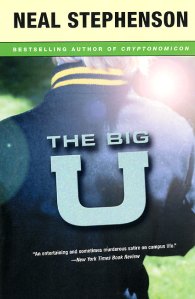 “Even when you have finished your schooling, it’s hard to forget the gut-churning excitement, the strange objectless yearnings, that accompany the beginning of the academic year. This is as true, I think, for kindergartners as it is for those completing their final year of college (graduate school, by all reports, is another, far more hellish story). But it is perhaps most intense during our undergraduate days. This mingled ease and pain attains to a special plangency in America, where the past, perhaps because we have so little of it, becomes mythic almost immediately, which I proffer as a reason for the preponderance of American books among those mentioned below. Or you can blame my deep-seated jingoistic urges […] here are eight of the very best books providing the drug of nostalgia we all crave, now that we’re sliding down—as Tom Lehrer once sang—the razor blade of life.”
“Even when you have finished your schooling, it’s hard to forget the gut-churning excitement, the strange objectless yearnings, that accompany the beginning of the academic year. This is as true, I think, for kindergartners as it is for those completing their final year of college (graduate school, by all reports, is another, far more hellish story). But it is perhaps most intense during our undergraduate days. This mingled ease and pain attains to a special plangency in America, where the past, perhaps because we have so little of it, becomes mythic almost immediately, which I proffer as a reason for the preponderance of American books among those mentioned below. Or you can blame my deep-seated jingoistic urges […] here are eight of the very best books providing the drug of nostalgia we all crave, now that we’re sliding down—as Tom Lehrer once sang—the razor blade of life.”
8/13/2012 – The Daily Beast
Must-Read College Novels: From “Lucky Jim” to “Pnin” by Sam Munson
“Indulging in some late-August back-to-school nostalgia, the Daily Beast put together a list of “Must-Read College Novels” ranging from Kingsley Amis’Lucky Jim to John Williams’ Stoner. As a fan of college, books, and college books, I thought I’d work up a supplementary list: the principal ingredients that no college novel can do without.”
8/27/2012, The Airship
Back to School: A List of Essentials for the College Novel by Kayla Blatchley
http://airshipdaily.com/blog/back-school-list-essentials-college-novel
Posted in campus novel, college novel, Lists, Rankings, Themes
Tagged Bret Easton Ellis, Donna Tartt, John Williams, Kingsley Amis, Less Than Zero, Lucky Jim, Martin Amis, Mary McCarthy, Michael Chabon, Nathan Harden, Neal Stephenson, Penelope Fitzgerald, Pnin, Richard Russo, Sex and God at Yale, Stoner, Straight Man, The Big U, The Gate of Angels, The Groves of Academe, The Rachel Papers, The Secret History, Vladimir Nabokov, Wonder Boys
Black Academic Fiction
I have recently stumbled upon a blog whose author wrote a dissertation titled The Over-Education of the Negro: Higher Education, Academic Novels, and the Black Intellectual. His blogging and some posts are of interest:
– On black academic fiction (bibliography)
– On academic criticism (bibliography)
– On academic films:
– On individual novels:
Posted in Bibliography, blogs, campus novel, college novel, films, Lists
Tagged A Single Man, As She Climbed Across the Table, Back to School, cinema, David Lodge, Der Blaue Engel, Educating Rita, Elaine Showalter, Fanshawe, Good Will Hunting, Higher Learning, Horse Feathers, Jonathan Lethem, Kinsey, Margaret Edson, movies, Nathaniel Hawthorne, Oleanna, Philip Roth, Possession, School Daze, Something the Lord Made, Surviving Desire, Tenure, The Blue Angel, The Human Stain, The Paper Chase, The Savages, The Squid and the Whale, Wit, Wonder Boys
Eros + pedagogy = [brain] sex
The American Scholar, Summer 2007
Love on Campus. Why we should understand, and even encourage, a certain sort of erotic intensity between student and professor
By William Deresiewicz
“Look at recent movies about academics, and a remarkably consistent pattern emerges. In The Squid and the Whale (2005), Jeff Daniels plays an English professor and failed writer who sleeps with his students, neglects his wife, and bullies his children. In One True Thing (1998), William Hurt plays an English professor and failed writer who sleeps with his students, neglects his wife, and bullies his children. In Wonder Boys (2000), Michael Douglas plays an English professor and failed writer who sleeps with his students, has just been left by his third wife, and can’t commit to the child he’s conceived in an adulterous affair with his chancellor. Daniels’s character is vain, selfish, resentful, and immature. Hurt’s is vain, selfish, pompous, and self-pitying. Douglas’s is vain, selfish, resentful, and self-pitying. Hurt’s character drinks. Douglas’s drinks, smokes pot, and takes pills. All three men measure themselves against successful writers (two of them, in Douglas’s case; his own wife, in Daniels’s) whose presence diminishes them further. In We Don’t Live Here Anymore (2004), Mark Ruffalo and Peter Krause divide the central role: both are English professors, and both neglect and cheat on their wives, but Krause plays the arrogant, priapic writer who seduces his students, Ruffalo the passive, self-pitying failure. A Love Song For Bobby Long (2004) divides the stereotype a different way, with John Travolta as the washed-up, alcoholic English professor, Gabriel Macht as the blocked, alcoholic writer. […] What’s going on here? If the image of the absent-minded professor stood for benevolent unworldliness, what is the meaning of the new academic stereotype? Why are so many of these failed professors also failed writers? Why is professional futility so often connected with sexual impropriety? […] Why are these professors all men, and why are all the ones who are married such miserable husbands?”
A student paper on a similar subject (analyses of Wonder Boys, On Beauty and The Art of Fielding):
http://scholar.harvard.edu/claybaugh/pages/biblarz-campus-novel-sex-campus-other-musings
Posted in campus novel, college novel, films
Tagged Chad Harbach, Crossing to Safety, Dead Poets Society, Herzog, In Her Shoes, Jeffrey Eugenides, Kepesh, Little Miss Sunshine, Mona Lisa Smile, Moonstruck, Oleanna, On Beauty, One True Thing, Philip Roth, Saul Bellow, Socrates, Surviving Desire, Symposium, Terms of Endearment, The Art of Fielding, The Life of David Gale, The Marriage Plot, The Squid and the Whale, Tuesdays with Morrie, Wallace Stegner, We Don’t Live Here Anymore, Who’s Afraid of Virginia Woolf?, Wonder Boys, Zadie Smith

